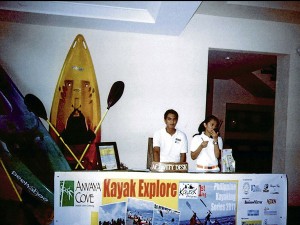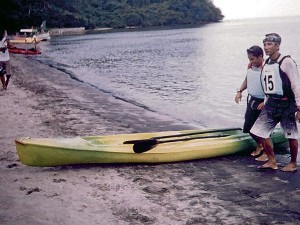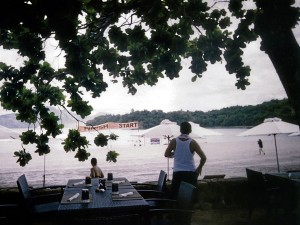
Kayaking started in the Philippines during the early 90s, promoted as a sport, as recreation, and for physical (and, as it turned out, for mental and psychological) development.
“We concentrate on water sports and we pioneered in kayaking in the country, more or less,” says Andrea (Didi) Camara, secretary-general of the Philippine Kayaking Association and vice-president of Sun & Sea Sports Systems, Inc., which undertakes water sports concessions in different resorts.
She spoke during the recent Kayak Explore Anvaya Cove-Zambales, a 32-kilometer kayak marathon which began and ended at Anvaya Cove, a high-end beach and nature club in Morong, Bataan. Sun & Sea initiated kayak clinics from north to south, and these were eventually followed by kayaking competitions, the latest of which was Kayak Explore 2011.
“It was difficult to raise funds,” Camara recalls. “But there were many takers because it was something new then. And there were media buyers.”

She adds, “All sponsorships are in kind so we are not really making money. Last year Canon was our sponsor so they gave cash prizes to the winners. This year, the association and Anvaya Cove split the budget.”
Prizes may include gift certificates, a two-seater kayak, and a round-trip to a nearby country like Thailand.
A significant sidelight during Kayak Explore was that Anvaya Cove was able to provide livelihood to neighboring fisherfolk who, for the delectation of participants and guests, whipped up a lavish buffet of galunggong (blue mackerel scad), transformed into succulent bola-bola, lumpiang Shanghai, calderetta, etc.
“We break even if we’re lucky,” Camara says wryly. “So we ask our sponsors, please give generously.” On a more professional level, the association and Sun & Sea are Department of Tourism consultants, and train people to conduct ecotours.
“We want people to learn kayaking, to go on tours and to make money from this activity,” the kayak executive says. “In the process they will save our rivers. They will teach communities not to throw their trash into the rivers. It’s really a community development thing.”
Warming up to the subject, she notes: “It’s really economics that we’re taking about. And economics is sustainability.”

In short, they teach people to become entrepreneurs, as there is income from training, there is income from conducting kayaking tours. Even tourists from mountainous countries like Bhutan, who want to learn kayaking, consult them.
There is a social-consciousness component to this. Backed up by the New Zealand Agency for International Development, the kayaking association and Sun & Sea train out-of-school youth and marginalized people to develop entrepreneurial skills, become trip outfitters, learn communication skills, and design and operate packages.
This provides them with an alternative income to fishing and gathering shells.
“We consider ourselves small entrepreneurs,” Camara concludes. “And you have to be creative even during the rainy season. You’ll never grow rich from this (kayaking) but it’s a passion.”

